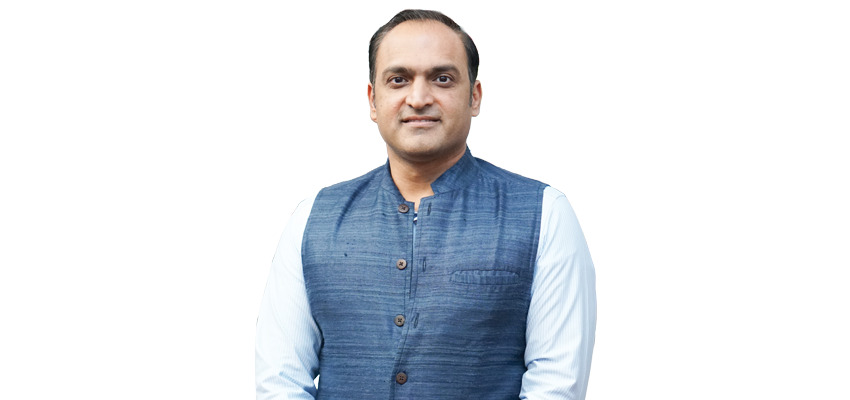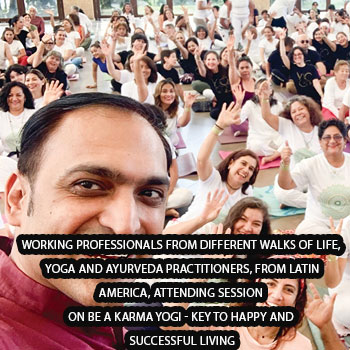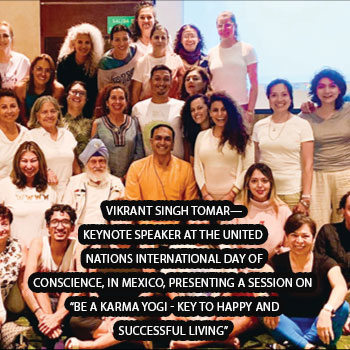Spirituality in Management

To lead within and amongst
With a mission to develop the world’s first ‘Integrated Manual of Humanity’, Dr. Vikrant Singh Tomar, an internationally recognised scholar, writer, management consultant and Global Convenor at United Consciousness Global, USA/ INDIA, has transformed lives of over three lakh individuals across 120 countries, including cabinet ministers, bureaucrats, defence and paramilitary personnel, corporate professionals, and prison inmates. The author of seven books on Indian Knowledge System, he perfectly blends philosophy with modern management to provide innovative and impactful training.
In his capacity as the Founder Director of Project Inc. USA, Dr. Tomar promotes scientific aspects of ancient Indian philosophy and culture across the globe. His commitment to the spread of Yogic teachings is further evidenced by his position as a Board Member of the European Yoga Federation in Italy. He also serves as the Founder and Board Member of the Spiritual Council in Africa, where he focuses on promoting healing and happiness throughout the African continent. Additionally, he founded the Akshara Kids Academy, an educational initiative dedicated to integrating 'Indic culture' into elementary-level education, ensuring a holistic development approach for young students. As the Founder Director of Ultimate Management Solutions (UMS) India, Dr. Tomar leads one of India's premier training and consultancy organisations, significantly impacting various sectors through his extensive expertise.
In an exclusive interview with Corporate Citizen, Dr. Tomar shares his professional journey, thoughts on management and philosophy, transforming corporate lives through spirituality, helping people build not only successful careers, but also meaningful lives
One thought at a time is called meditation. One per - son at a time is called relation. One problem at a time is called management. One day at a time is called life. And, it's all about focus
— Dr. Vikrant Singh Tomar
The inside out leadership journey
Reflecting on how to become a more humancentric leader by learning, listening, inspiring and caring
Corporate Citizen: What motivated you to pursue such a diverse range of disciplines, and what continues to fuel your hunger for learning every day?

Dr. Vikrant Singh Tomar: All disciplines, in some way, are expressions of the same truth. When we talk about science, every discipline within, is essentially an exploration of truth. Art forms, too, are nothing but different portrayals of the same truth. And, when it comes to spiritual practices, they too are experiences of truth. Whether it is philosophy, science or art—truth is always at the centre. What we are learning in economics or trying to find in journalism, it's all about truth.
Science experiments with the truth, while the quest of human being is to realise the truth. And, from this quest various disciplines have taken place. This very understanding of truth is called ‘Veda’—to know; so the quest of knowing the truth is Vedas. Within these Vedas, you will find references of everything—Vyakaran (Grammar), Dhanur Vidya (the art of archery) and all different Vidyas (disciplines).
The areas of management, psychology, journalism, philosophy, public administration, which I pursued, revolve around human beings. They are social in nature. Whichever subject we study, it says that if you dig deep into any problem you'll find human involvement. If a train accident has taken place, for instance, you'll find a human mistake. Even great civilisations, like the Roman Empire, collapsed from within. Then the question arises, why did humans make those mistakes, and why weren’t they motivated enough? Then probably you may also venture into different dynamics of their psyche—psychology comes here. Even psychology says that whatever you are today is because of your nature and nurture—how your parents raised you, the environment and nature, and how you perceive the environment.
But then, how come identical twins who come from the same zygote, and share both nature and nurture, can still turn out different? After 18 years, you find their personalities almost opposite. Psychology does not have any convincing answer. That's when philosophy comes in, saying that it's not only nature and nurture—it is the Janma Sanskaras (impressions from past life), the Yatra (journey), the person is carrying. So, experimenting with the truth and understanding human in deeper—within and outside—made me read all these things.
"If modern management education had originated in India, we would never have used the word human resources—we are not resources. Resources are objects without purpose, while humans have their own purpose"
CC: You have addressed on various global platforms such as the United Nations. What message did you share there and how is it relevant to Indian organisational leaders today?
On global platforms like United Nations, India is seriously being misunderstood by the West. British historian and academician, Thomas Babington Macaulay, said that whole wisdom of Indian tradition—the books, Vedas, Upanishads—has less wisdom than one shelf of a good library in Europe. This is how they perceived and underestimated Indian knowledge.
I've shared a lot about human rights during my Europe and West talks. Globally, there is so much discussion happening about fundamental rights. But, if you study Indian scriptures; our focus has never been on rights. There is no concern in the scriptures about human rights. So, why we didn't talk about it? Reason, rights are the effect, responsibilities are the cause. If every human is aware and alert about his or her own responsibilities, rights of others will be protected. If husband is accountable and conscious about his responsibilities towards wife, there is no question of wife talking about her rights. If parents are conscious about their responsibilities towards the kids, there is no talk about kids’ rights. The very concept of rights only comes up when someone has failed to fulfil their responsibilities. So we, in Bhartiya Manas (Indian Consciousness), talk about our responsibilities.
CC: As you have worked across government, military, academia and corporations, what common values do you believe unify effective leadership across these domains?
The essence of Mahabharata—considered the world's longest epic poem and a major scripture in Hinduism—is not that it is 1,00,000 verses, it is about Satyam Vad Dharmam Chara— means speaking the truth and abiding by your Dharma (righteous duty). This is the essence of leadership. Why you should speak the truth? Because, truth makes you trustworthy, and trust is the foundation of team. If a team does not trust its own leader, it will fall apart. In your act you should follow Dharma. So, whether it is government or private, leaders should follow the core message of Mahabharata - Satyam Vad, Dharmam Chara.
CC: When you address people across continents, how do they respond to Indian philosophical frameworks in leadership?

They love it for its depth and they haven't heard something like it before. If modern management education had originated in India, we would never have used the word human resources—we are not resources. Resources are objects without purpose, while humans have their own purpose. The term 'human resources' came during industrialisation—when humans where treated like tools, often those who were colonised or enslaved. From there, this whole gimmick of human resources started and that's why today people are suffering in corporate.
The Indian philosophy of leadership talks about self-leadership first, and then leading others. It talks more about being righteous in your actions. When India was in power, we spread trade, we spread tranquillity. India contributed 23 percent of the global GDP till 17th century—we were that powerful. We were global leaders till we followed our own principles of leadership, our own Shastras (instructions). But, we were taught different books after 18th century and see we have reached three per cent of the global GDP today.
"The Indian philosophy of leadership talks about self-leadership first, and then leading others. It talks more about being righteous in your actions "
CC: You have pursued diverse disciplines, from management to journalism to philosophy and yoga. How has this education journey shaped your world view and leadership style?
I am a traveller, I meet people of diverse background. I study lot of disciplines, which helps me connect with everybody, wherever I go. So, from whatever discipline people come from, my disciplines helps me to connect with them and see the same truth from different dimensions.
CC: Vedanta and corporate training, you have blended the two worlds that seem miles apart. What's the first reaction you usually get from the corporates?
Majority cases are awestruck because they have never seen and heard ancient Indian knowledge that profound, and they want to learn more about it.
CC: You've helped people see yoga as more than just physical exercise. How would you explain it to someone who thinks it's only about stretching and working out?
Yoga Sutra has 195 verses, only one verse talks about physical exercise and the rest 194 verses are about psychology and spiritual growth. But, somehow that one verse is the easiest verse and that's why picked up easily. Before telling a person to read Yoga Sutras, I question him/her about the stressess and challenges they are going through their life. If they are, only then I tell them to go through the 194 sutras, as they are not about the body. There is a completed series on YouTube channel of United Consciousness, where all the 194 sutras of Patanjali Yoga Sutra have been explained in detail.
CC: Having helped shape national policies including on drug abuse, how do you navigate the balance between compassion and control in policy making?
Regarding policy making, both compassion and control are important. Policy should be made with compassion and executed with strong control. While you are making it, make it with compassion. Once you make it with compassion, then execute it with absolute control.
CC: What would you advise to future managers for their professional goals, their future endeavours?
There are two objectives they should be promoted for — Atmano Mokshartham, Jagat Hitaya Cha. All managers should lead themselves for what is right, wherever they work. Atmano Mokshartham means the state of mind in which your happiness should not depend on any person, place, thing and period. I will be happy and I will be the flag bearer of happiness in the corporate world. Jagat Hitaya Cha means every day one should count their success, by the ways in which you have worked for the well-being of others.
CC: What's one myth about success that you believe misleading today's youth?
They think success is about material things, but only those people who have achieved material things will realise that success is not about that. Swami Vivekananda rightly said that materialism and spiritualism are two wings of the bird of life. Material prosperity has to be backed by spiritual elevation. In absence of spiritual elevation, materialism becomes a rollercoaster ride, when things are favourable, we smile and when they are unfavourable, we mourn. Spiritualism gives us ability to being equipoised in all ups and downs in life.
Management and Leadership
The ancient Indian view
India is a cradle of ancient religious wisdom, which can serve as a beacon of clarity and inner truth, in a world filled with information and noise. How can good management be rooted in India's ancient spiritual values and culture?
CC: What does conscious leadership mean to you, especially in today's corporate world?
When we talk about conscious leadership, any form of leadership begins with self. If I can influence self for right, I can influence others also. One-word definition of leadership is influence, but influencing who? So, first influencing self and then influencing others. Leader is one who walks his talk. So, when we say conscious leader, he is the one who can first consciously lead self and then can lead others also. Here, when we say conscious, initially one consciously leads self, but later when he becomes a master in leading, then everything happens consciously. The way he conducts himself, itself is called leadership.
CC: How can the philosophy of Vasudhaiva Kutumbakam (The world is one family) shape inclusivity and the value based work culture?
When you say, Vasudhaiva Kutumbakam—this whole Vasudha (the flora, fauna, this whole animal, human kingdom)—it doesn't say that only human beings are good. It says all beings— every living being is a family, because we affect each other, we influence each other and the whole biosphere. But, how does it talk about inclusivity? Indian philosophy of Advaita reflects in Vasudhaiva Kutumbakam. The meaning of Advaita is that we are not two, we are one. And, that is why you see in India, we do not have foreign ministry because nobody is foreign for us—it is only Ministry of External Affairs. When India hosted G20 Summit, Vasudhaiva Kutumbakam was the theme and we were international coordinator where we promoted this feeling of togetherness worldwide.
CC: With reference to one of your popular books - Rule the World as Krishna Did, how can it enhance the corporate decision making?

Indian civilisation had encountered this question, thousands of years back. What is ‘right’, when you say decision making has to be ‘right’? We in India call it ethical decision making. Decision making is the heart of leadership. So, a leader has to be ethically correct, morally correct and should be of good character—these three distinguishing qualities are important. Samanya Dharma, is about being ethically correct; Vishishta Dharma, is about being morally correct; and, Guna Dharma refers to an individual's inherent good character.
Samanya Dharma means something which is applicable for all, at all the places, at all the times. Certain basic principles and human values that are applicable for all. Even if you are my subordinate, individual's dignity has to be protected—it is a constitutional right and human right. Justice, truth, being together, love, respect—these are basic values. They cannot be compromised in any corporate. If you are not performing, still I have to assure that I should keep your dignity intact. I should talk to you nicely. It should be upholded in any corporate or any place.
Vishishta Dharma, means that there are certain liabilities on me and till I work for say a corporate organisation, the Standard Operating Procedures (SOPs) of that organisation, will work on me. The moment I resign, they won't work. So, I should be honest towards the SOPs of the company. I should be honest towards the humanity.
Gun Dharma, means I should choose and walk in the path, which is in line with my true nature.
CC: How can the connection between Dharma and Karma as mentioned in Indology, influence today’s corporate work culture and employee experience?
For holistic experience where Dharma and Karma all should come together, today's corporate should follow Taittiriya Upanishad— it talks about five sheaths of personality:
Annamaya Kosha— we should be physically fit and the food we eat can significantly modify the body to stay fit. If you are not physically fit, the millions and billions you make is of no use. Your whole productivity will go down, if you have an unfit body. The first thing corporates should uphold is, every employee should be physically fit.
Pranamaya Kosha— be agile, and what you eat effects your agility. If you eat appropriate, you'll be energetic—you will be a go-getter. Every employee should be go-getter, agile, and not dull. It is directly connected with the food you eat and the vibration of the environment you create.
Manomaya Kosha— refers to your emotional intelligence. What you eat and how agile you are, directly impacts your emotions. So, you should be emotionally balanced before saying something. You should be very appropriate while speaking—don't be reactive, otherwise you will spoil the environment, and the ripple effect will impact others.
Vijnanamaya Kosha— you should be intellectually sharp. An environment where you learn, should be an environment that keeps employee engagement high.
Anandamaya Kosha— every corporate should ask, are my employees happy? If not, what are they earning money for—working ten hours so that they can spend and enjoy for only two days in the week. Isn't it useless? We should be working with happiness rather than working for happiness.
CC: How can these principles of emotional quotient (EQ), from the ontology perspectives, be utilised to help the corporates improve over their EQ?

There are lots of definition of emotional intelligence given in scriptures. Samatvam Yoga Uchyate means, in all the ups and downs of life, just hold back like cloud. All those emotions will come and go. All those reactions, all those words you felt sorry for, they were reactive in nature—be equipoise. When things are good, don't be too much overwhelmed and express yourself. When things are bad, don't be so much dull. Samadho Achala Buddhi, a stable intellect—in any experience of life, it is crucial that we should be focused.
In Bhagavad Gita, refers to a phrase called Bahushakha Buddhi (distracted mind)—I'm talking to you, but my mind is somewhere else. Physically, I am somewhere else, my brain is somewhere else, and I can't focus on any person. Bhagavad Gita says Vyavasāyātmikā Buddhir (absolutely focused mind). In psychological context it means, out of 126 bits of my focus, I should give 120 bits to one I am speaking to in a conversation—that's absolute focus.
One thought at a time is called meditation. One person at a time is called relation. One problem at a time is called management. One day at a time is called life. And, it's all about focus.
"Decision making is the heart of leadership. So, a leader has to be ethically correct, morally correct and should be of good character"
CC: There are places where mentoring part is playing a major role. What makes mentoring culture, successful across different sectors?
In many other organisations I see, mentoring is considered as a common sense, which it is not. Many of the seniors feel that as they have 20 years of experience, they can mentor people easily. It is fine that you have 20 years of experience in leadership, however, mentoring and leadership are poles apart.
In leadership, leader speaks and subordinate listen, but in mentoring, subordinate speak and mentor listens. In leadership, leader decides and subordinate follows, but in mentoring, subordinate decides and mentor doesn’t. So, it's exact opposite—leaders have to be groomed as mentors, only then mentoring culture will happen. For instance, if you implement mentoring in a organisation, and 10 are mentors and 30 are mentees, the reporting bosses of the 30 mentees will not release them to the mentors because the bosses do not understand the intricacy and importance of mentoring. So, sensitisation is needed for seniors and mentors have to be certified in mentoring. Only then bosses can be sensitised and projects will be successful.
CC: So here, how can leaders apply selfmanagement through self-evaluation practically?
I have authored a book titled Self-Management Through Self-Evaluation. This is the world's first book in which there are 33 questionnaire based on ancient Indian wisdom. Every questionnaire here is rooted back to some of the anciant Indian scriptures. The book talks about various aspects of your personality. For example, as a leader what should be my state of mind? So, Patanjali Yoga Sutra says, it should be out of these five states of mind — Kshipta (distracted), Mudha (dull), Vikshipta (disturbed), Ekagra (absolute focused) and Niruddha (absorbed).
As a leader, my state of mind should be either Ekagra (absolute focused) or Niruddha (absorbed). Niruddha is a level of focus where I forgot even myself in that state of mind. If I'm at a critical position, I should be able to listen to a person. I know many such leaders, who start seeing a power point presentation in morning 9 a.m. and they'll continue seeing it till 8 in the evening, with absolute focus. And yet, they are so attentive to make corrections after the last slide presentation. So, when we talk about these five states of mind, if your mind is 70 per cent distracted, disturbed or dull, the question is, how will you lead?
You'll throw tantrums and the ripple effect of that will create disturbance, which will spoil the environment of the whole organisation. And, that's how you should calculate where you stand and then start developing on that.
CC: How do you maintain personal alignment amidst these global responsibilities which you carry?
Bhagavad Gita tells Yuktāhāra-Vihārasya Yukta-Ches.ht.asya Karmasu YuktaSvapnāvabodhasya Yogo Bhavati Duh.kha-Hā— wherein Yuktāhāra means balanced diet, Yuktāhāra-Vihārasya means give equal time to your family, yuktāhāra-vihārasya yuktaches.ht.asya karmasu means whenever you do your work, give it your 100 percent, YuktaSvapnāvabodhasya, means sleep at right time and get up at right time. This is the Yoga, if you want to balance work-life.
I travel a lot, and there are three things that has really helped me. One, I made my family understand the purpose of my travel—around 80 per cent of my travel is not for earning money. It is for making the world a better place. So, when my family connects with a purpose, they realise that they are there to contribute in making a better world. It's everybody's duty, and that sensitivity helps. Second, when I am at home, every single day in the last two decades, we always go for a drive together, sit back, and talk to each other. Third, when I'm home, I apply 80:20 ratio, 80% they speak, I limit my speaking to 20 per cent. And, I do the listening part. The fourth is, all of my family members are now a part of the mission 'United Consciousness' I'm heading—we all work together it.
CC: Which Indian value should every corporate leader embrace and why?
Dharmo Rakshati Rakshitah—if you protect righteousness, righteousness will protect you back. Live by Dharma—live whatever is right. And, this is what is expected from corporates also. When corporates live with honesty, their philosophy is righteousness, then automatically things will work because Dharma will protect them back.